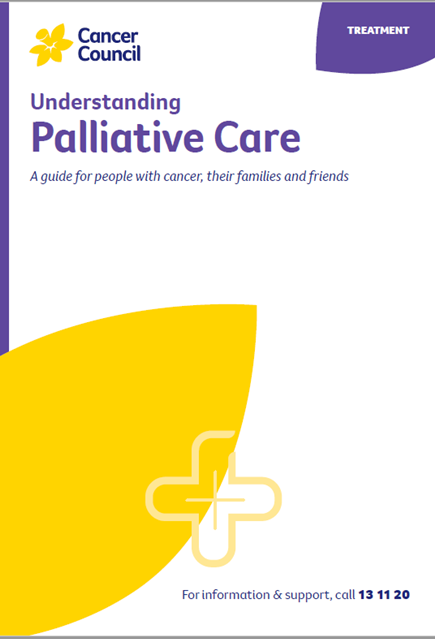- Home
- Cancer Information
- Managing side effects
- Sexuality, intimacy and cancer
- Treatment side effects
- Palliative treatment
Palliative treatment
Palliative treatment aims to improve someone’s quality of life by managing the symptoms of cancer, without trying to cure the disease. Many people think palliative treatment is only for at the end of life, but it can help at any stage of advanced cancer. As well as slowing the spread of cancer, palliative treatment can relieve pain and manage symptoms.
Many people say that sexuality and intimacy continue to be important to them even when cancer is advanced. It’s okay to talk to your health care team about the impact of any treatment on your sex life or your ability to be intimate.
If you have a partner, try to spend intimate or quality time together, rather than as a “patient” and “carer”, during palliative treatment. If you are in hospital or hospice care, ask your treatment team if it’s possible to use a double bed so you can cuddle and be together. Intimacy can provide comfort and maintain connection during this time. Even if sexual intercourse is no longer possible or desired, you may enjoy physical closeness through touching, massage or simply lying beside each other.
For more on this, see Palliative care and Living with advanced cancer.
→ READ MORE: Resuming sexual activity after treatment
Podcast: Sex and Cancer
Listen to more of our podcast for people affected by cancer
Dr Margaret McGrath, Head of Discipline: Occupational Therapy, Sydney School of Health Sciences, The University of Sydney, NSW; Yvette Adams, Consumer; Dr Kimberley Allison, Out with Cancer study, Western Sydney University, NSW; Andreea Ardeleanu, Mental Health Accredited Social Worker, Cancer Counselling Service, Canberra Health Service, ACT; Kate Barber, 13 11 20 Consultant, Cancer Council Victoria; Dr Kerrie Clover, Senior Clinical Psychologist, Psycho-Oncology Service, Calvary Mater Newcastle, NSW; Maree Grier, Senior Clinical Psychologist, Royal Brisbane and Women’s Hospital, QLD; Mark Jenkin, Consumer; Bronwyn Jennings, Gynaecology Oncology Clinical Nurse Consultant, Mater Health, QLD; Dr Rosalie Power, Out with Cancer study, Western Sydney University, NSW; Dr Margaret Redelman OAM, Medical Practitioner and Clinical Psychosexual Therapist, Sydney, NSW; Kerry Santoro, Prostate Cancer Specialist Nurse Consultant, Southern Adelaide Local Health Network, SA; Simone Sheridan, Sexual Health Nurse Consultant, Sexual Health Services – Austin Health, Royal Talbot Rehabilitation Centre, VIC; Prof Jane Ussher, Chair, Women’s Heath Psychology and Chief Investigator, Out with Cancer study, Western Sydney University, NSW; Paula Watt, Clinical Psychologist, WOMEN Centre, WA.
View the Cancer Council NSW editorial policy.
View all publications or call 13 11 20 for free printed copies.
Need to talk?
Support services
Coping with cancer?
Speak to a health professional or to someone who has been there, or find a support group or forum
Life after cancer treatment
Webinars, exercise and nutrition, sexuality programs, and back-to-work support
Cancer information
Cancer treatment
More information about cancer treatments, including chemotherapy, radiation therapy and surgery
